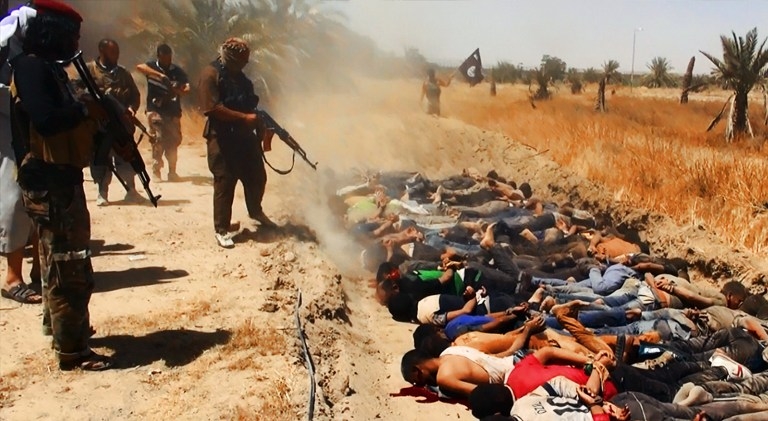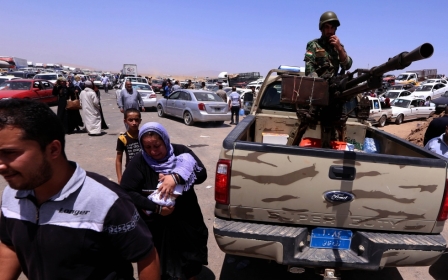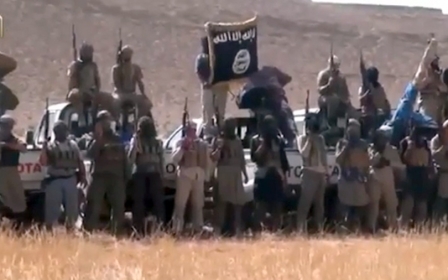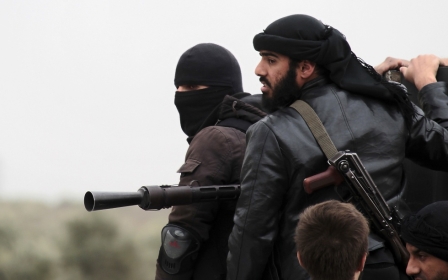Watchdog: at least 160 killed in Tikrit, Iraqi forces make gains

Human Rights Watch said Friday that Sunni militants led by Islamic State of Iraq and the Levant (ISIL) have killed at least 160 people in Tikrit, while ISIL claim a higher death toll.
Peter Bouckaert, emergencies director of the rights group, said photographs released by the militants and satellite pictures showing ISIL’s acts of violence across Iraq constitute strong evidence of war crimes that should trigger an initial investigation.
The killings took place in two neighbourhoods in Tikrit between 11 and 14 June, said Bouckaert. While he estimated the death toll at 160 to 190 people, Bouckaert said the exact number may increase due to the difficulty of determining the location of the bodies.
ISIL heading a coalition of Baathists and Sunni tribal militants fighting the Iraqi army, claimed to have executed about 1,700 Shiite Iraqi troops during clashes in Tikrit on 12 June. The group released the alleged photos of the killings on a website.
The Iraqi army's spokesperson, Qasim al-Mousavi, confirmed the authenticity of the images.
ISIL militants have made advances in the country since 10 June, and have seized Mosul and a number of other cities and towns in the north and west of Iraq.
Iraq has seen a marked increase in sectarian violence between Sunni and Shiite Muslims in recent months.
As violence between ISIL-led Sunni militants and Iraqi army forces continues throughout the country, Iraqi forces bombarded the city Tikrit on Friday, targeting the university campus in an effort to retake it from insurgents.
Iraqi forces swooped into Tikrit University by helicopter on Thursday, and a police major said that there were periodic clashes between insurgents and security forces on the campus on Friday.
A senior officer told AFP that taking the university is an important step in regaining control of Tikrit, the hometown of executed dictator Saddam Hussein, which was seized by Sunni insurgents on 11 June.
Another senior army officer told AFP that Iraqi forces were carrying out a major wave of air strikes against militants in Tikrit to protect the forces at the university and prepare for an assault on the city.
Iraqi troops are also deployed in areas around Tikrit in preparation for the assault, the officer added.
Political measures needed
The military operation came after Prime Minister Nuri al-Maliki conceded on Thursday that political measures will also be needed to defeat the jihadist-led offensive that has overrun major parts of five provinces.
Maliki, who has publicly focused on a military response to the crisis.
In an interview with the BBC, Maliki said the Syrian air force had carried out strikes against militants on the Syrian side of the Al-Qaim border crossing, which is controlled by the jihadist Islamic State of Iraq and the Levant (ISIL).
Maliki said Baghdad had not requested the Syrian strikes, but he "welcomed" any such move against the ISIL-led militants.
Kurdish disputed areas
In further fallout from the crisis, the president of Iraq's autonomous Kurdish region declared there was no going back on Kurdish self-rule in disputed territory, including ethnically divided northern oil city Kirkuk, now defended against the militants by Kurdish fighters.
Iraqi Kurdish leader Massud Barzani said Baghdad could no longer object to Kurdish self-rule in Kirkuk and other towns from which federal forces pulled out in the face of the insurgent advance.
"Now, this (issue) ... is achieved," he said, referring to a constitutional article meant to address the Kurds' decades-old ambition to incorporate the territory in their autonomous region in the north over the objections of successive governments in Baghdad.
Speaking at a joint news conference with visiting British Foreign Secretary William Hague, Barzani said: "We have been patient for 10 years with the federal government to solve the problems of these (disputed) areas.
"There were Iraqi forces in these areas, and then there was a security vacuum, and (Kurdish) peshmerga forces went to fill this vacuum."
Iraq's flagging security forces were swept aside by the initial insurgent push, pulling out of a swathe of ethnically divided areas, including the northern oil hub of Kirkuk.
Despite Barzani's declaration, it is likely that the territory row will continue to haunt Iraq for years to come.
International community
Iraq has appealed for US air strikes against the militants, but Washington has only offered up to 300 military advisers, the first of whom have begun work in Baghdad.
The authorities have also purchased at least eight fighter jets from Russia, and six more that are currently stored in Belarus, in a deal valued by most newspapers at up to $500 million.
Washington has urged Iraq's fractious leaders to unite in the face of the militants, and Hague echoed that message Thursday, saying the "urgent priority must be to form an inclusive government."
Washington has stopped short of calling for Maliki to go, but has left little doubt it feels he has squandered the opportunity to rebuild Iraq since American troops withdrew in 2011.
New MEE newsletter: Jerusalem Dispatch
Sign up to get the latest insights and analysis on Israel-Palestine, alongside Turkey Unpacked and other MEE newsletters
Middle East Eye delivers independent and unrivalled coverage and analysis of the Middle East, North Africa and beyond. To learn more about republishing this content and the associated fees, please fill out this form. More about MEE can be found here.




